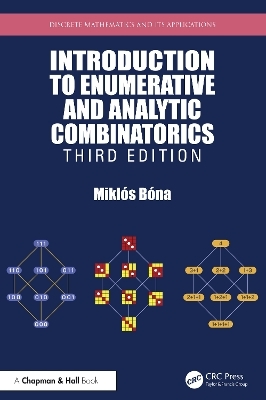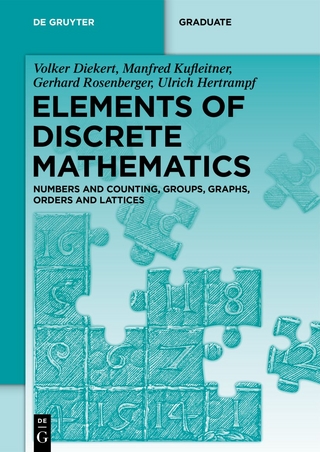
Introduction to Enumerative and Analytic Combinatorics
Chapman & Hall/CRC (Verlag)
978-1-032-30270-6 (ISBN)
- Noch nicht erschienen (ca. März 2025)
- Versandkostenfrei innerhalb Deutschlands
- Auch auf Rechnung
- Verfügbarkeit in der Filiale vor Ort prüfen
- Artikel merken
The book first deals with basic counting principles, compositions and partitions, and generating functions. It then focuses on the structure of permutations, graph enumeration, and extremal combinatorics. Lastly, the text discusses supplemental topics, including error-correcting codes, properties of sequences, and magic squares.
Updates to the Third Edition include:
§ Quick Check exercises at the end of each section, which are typically easier than the regular exercises at the end of each chapter.
§ A new section discussing the Lagrange Inversion Formula and its applications, strengthening the analytic flavor of the book.
§ An extended section on multivariate generating functions.
Numerous exercises contain material not discussed in the text allowing instructors to extend the time they spend on a given topic. A chapter on analytic combinatorics and sections on advanced applications of generating functions, demonstrating powerful techniques that do not require the residue theorem or complex integration, and extending coverage of the given topics are highlights of the presentation.
The second edition was recognized as an Outstanding Academic Title of the Year by Choice Magazine, published by the American Library Association.
Miklós Bónareceived his Ph.D in mathematics from the Massachusetts Institute of Technology in 1997. Since 1999, he has taught at the University of Florida, where, in 2010, he was inducted into the Academy of Distinguished Teaching Scholars. Professor Bóna has mentored numerous graduate and undergraduate students. He is the author of four books and more than 65 research articles, mostly focusing on enumerative and analytic combinatorics. His book, Combinatorics of Permutations, won a 2006 Outstanding Title Award from Choice, the journal of the American Library Association. He is also an Editor-in-Chief for the Electronic Journal of Combinatorics, and for two book series at CRC Press.
Basic methodsWhen we add and when we subtractWhen we multiplyWhen we divideApplications of basic counting principlesThe pigeonhole principleNotesChapter reviewExercisesSolutions to exercisesSupplementary exercises
Applications of basic methodsMultisets and compositionsSet partitionsPartitions of integersThe inclusion-exclusion principleThe twelvefold wayNotesChapter reviewExercisesSolutions to exercisesSupplementary exercises
Generating functionsPower seriesWarming up: Solving recurrence relationsProducts of generating functionsCompositions of generating functionsA different type of generating functionsNotesChapter reviewExercisesSolutions to exercisesSupplementary exercises
TOPICS
Counting permutationsEulerian numbersThe cycle structure of permutationsCycle structure and exponential generating functionsInversionsAdvanced applications of generating functions to permutation enumerationNotesChapter reviewExercisesSolutions to exercisesSupplementary exercises
Counting graphsTrees and forestsGraphs and functionsWhen the vertices are not freely labeledGraphs on colored verticesGraphs and generating functionsNotesChapter reviewExercisesSolutions to exercisesSupplementary exercises
Extremal combinatoricsExtremal graph theoryHypergraphsSomething is more than nothing: Existence proofsNotesChapter reviewExercisesSolutions to exercisesSupplementary exercises
AN ADVANCED METHOD
Analytic combinatoricsExponential growth ratesPolynomial precision
More precise asymptoticsNotesChapter reviewExercisesSolutions to exercisesSupplementary exercises
SPECIAL TOPICS
Symmetric structuresDesignsFinite projective planesError-correcting codesCounting symmetric structuresNotesChapter reviewExercisesSolutions to exercisesSupplementary exercises
Sequences in combinatoricsUnimodality
Log-concavity
The real zeros property
Notes
Chapter review
Exercises
Solutions to exercises
Supplementary exercises
Counting magic squares and magic cubesA distribution problem
Magic squares of fixed size
Magic squares of fixed line sum
Why magic cubes are different
Notes
Chapter review
Exercises
Solutions to exercises
Supplementary exercises
Appendix: The method of mathematical induction
Weak induction
Strong induction
| Erscheint lt. Verlag | 11.3.2025 |
|---|---|
| Reihe/Serie | Discrete Mathematics and Its Applications |
| Sprache | englisch |
| Maße | 156 x 234 mm |
| Themenwelt | Mathematik / Informatik ► Mathematik ► Graphentheorie |
| ISBN-10 | 1-032-30270-4 / 1032302704 |
| ISBN-13 | 978-1-032-30270-6 / 9781032302706 |
| Zustand | Neuware |
| Informationen gemäß Produktsicherheitsverordnung (GPSR) | |
| Haben Sie eine Frage zum Produkt? |
aus dem Bereich
